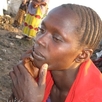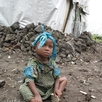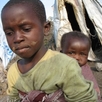Travelogues
Africa makes a different impression on everyone. Not even two persons can tell the same way what they have seen. Through our diary you can see how this magnifique country influenced the tourists with its unique culture and beautiful landscapes. The humanitarian tourists will share their experiences, their thoughts and feeilings just like the colleagues of the Foundation for Africa who have been working here since longer period.
Interview with a raped widow, a mother of three
2009. June 11.
The morning was passing quietly, things were going in the African rhythm of life. We wanted to see the director of the transport company with whom we were working together. Although we had not found him, we received good news at least: our containers were already on the way and close to arrive.
Doctor Kofa invited us for a delicious lunch. It was really great to eat "fufu" again. After the lunch, we departed to the refugee camp. Let me briefly explain here, why the camp technically could not be called a refugee camp. Refugee camps are those which provide temporary shelter for people fleeing from another country. Those are the real refugee camps. But when people are forced to seek refuge within the borders of their own country, they are not considered and recognised as refugees, thus the place set up to accommodate them cannot be called a refugee camp, either. These people have a so-called IDP status, that is, internally displaced people. Thus, the camps are in reality IDP camps.
Returning to our story, I could interview two people today. Both were "leaders". The only difference between them was that one was a 28-years-old mother of three, while the other was a twelve-year-old orphan girl, who had yet to take care of her two siblings, as well. The story of both were shocking, and told drawn to the life all the horrors and consequences of the war that had claimed 5,5 million lives. This was the most tragic war with the highest death toll since the Second World War. Yet, the world, the international community and the media had all been silent and followed the heart-rending events without reaction.
A widow, Giziri's story of her escape
Giziri's life started just like in a fairy tale. She was living happily with her husband in the village, they had a tidy house, a small piece of land and stock. The man provided for the everyday meal of the family, and the children were attending school. This lasted only until the rebels captured the village. They looted almost every house and family, the women were raped and the men were conscripted. Giziri and her family somehow managed to flee, but they could not get too far. They bumped into a rebel band on the way. The rebels did not injure them, but asked Giziri's husband to join the troops. Giziri’s husband was not willing to do so, therefore he was shot by the gunmen before the very eyes of his wife and children. Thanks to some miracle the family managed to run away again. Yet, they had been deeply traumatised by the event. The six-year old boy was still vividly remembering that day and often said, "When I grow up, I will be powerful and when I meet the murderers of my dad, I will kill them." After a trudge of 80 kilometres, the family found refuge at Catholic nuns, who took care of them for some time. Later, they were all transported to the refugee camp. Here, life brought them other tragedies. The camp turned into a hell for Giziri, when one evening one of the policemen of the camp took advantage of his power and raped her. The delinquent was put in prison for a short while, after the rules of the Congolese judicial system. But in return for a little slush-fund, he was soon released and was now freely living his life. Since then Giziri has been suffering from a number of psychic and physical diseases, about which she did not want to tell more, because, as she said, those were secrets between God, her and her doctor. Following the sad events, Giziri gave birth to a baby, whom the policeman did not want to acknowledge as his own daughter. Giziri was having constant remorse every time when her six-year-old son asked, who the father of his sister was, as she did not use to be with them when they arrived at the camp.
“What does it mean to you to be a woman?”, I asked Giziri. She replied, disheartened and her head hung: "I do not know whether I can still consider myself a woman after all what has happened to me. Everybody looks down on me and I have no dignity anymore..." (The details of the interview will be published soon in a separate report.)
Gallery Take a look on the pictures taken of our different projects.



